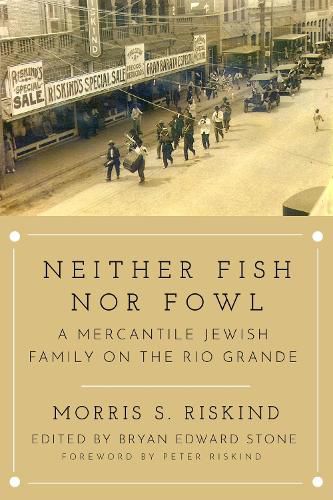Readings Newsletter
Become a Readings Member to make your shopping experience even easier.
Sign in or sign up for free!
You’re not far away from qualifying for FREE standard shipping within Australia
You’ve qualified for FREE standard shipping within Australia
The cart is loading…






Neither Fish nor Fowl: A Mercantile Jewish Family on the Rio Grande is the memoir of Morris Riskind, who was born and lived most of his life in the small Texas border town of Eagle Pass. Riskind's parents, Michael and Rachel, were Russian Jewish immigrants who arrived in Eagle Pass in 1910, where Michael founded a clothing store that three generations of his family operated for nearly a century.
After Michael's retirement in the 1950s, Morris took over management of the store, which had become a local institution catering to and employing a wide variety of the area's residents, including Anglos and Latinos, US and Mexican residents.
As the themes of Jewish identity, family business, and the borderland intersect in the Riskind store, they provide the foundation of Morris Riskind's memoir, which, although set mostly in one small Texas city, chronicles Riskind's vast life experience. The book's interest lies in Riskind's distinctive point of view, the many ways in which his life diverged from the expected norms of both American Jewish history and borderland society. This lively, far-ranging story depicts not only a family, a business, and a very small Jewish community but an altogether neglected facet of the American Jewish experience.
$9.00 standard shipping within Australia
FREE standard shipping within Australia for orders over $100.00
Express & International shipping calculated at checkout
Neither Fish nor Fowl: A Mercantile Jewish Family on the Rio Grande is the memoir of Morris Riskind, who was born and lived most of his life in the small Texas border town of Eagle Pass. Riskind's parents, Michael and Rachel, were Russian Jewish immigrants who arrived in Eagle Pass in 1910, where Michael founded a clothing store that three generations of his family operated for nearly a century.
After Michael's retirement in the 1950s, Morris took over management of the store, which had become a local institution catering to and employing a wide variety of the area's residents, including Anglos and Latinos, US and Mexican residents.
As the themes of Jewish identity, family business, and the borderland intersect in the Riskind store, they provide the foundation of Morris Riskind's memoir, which, although set mostly in one small Texas city, chronicles Riskind's vast life experience. The book's interest lies in Riskind's distinctive point of view, the many ways in which his life diverged from the expected norms of both American Jewish history and borderland society. This lively, far-ranging story depicts not only a family, a business, and a very small Jewish community but an altogether neglected facet of the American Jewish experience.